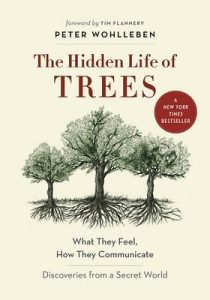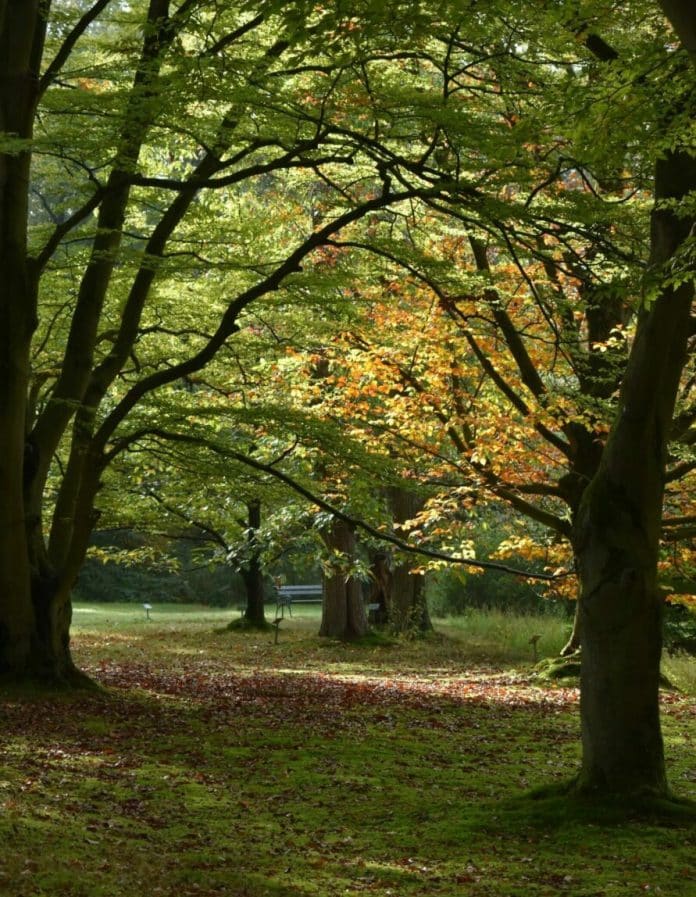If you saw it, you’d agree: It’s the gem of our town. Not as big as the one in Vellum Heights, but clean, well-designed, with paved walking paths, a pond full of vibrant, speckled koi, and a climbing apparatus built just for the kids. Its half-mile circumference holds five hundred trees – towering oaks and regal sycamores, luscious magnolias that flower in spring, beeches with smooth grey elephant skin, papery birches and prickly ash.
Some of us are old enough to remember those trees – not those trees of course, but ones like them, that grew in our yards and in the neighborhood park, a mute green watercolor backdrop to our lives. We remember the smells of fresh-cut grass, and rain, and mud, and the breeze on our face. Indescribable now, like the sky when it was blue.
Now we all wear the mask. For the sake of our kids, we pretend not to hate it as much as we do, but it makes no difference; our kids refuse to put it on. From the moment they exit their sleeping pods, after every meal and every bath, we are reduced to chasing them around the house like ogres out of some macabre fairy tale. We hold them down as they kick and scream, force the nozzle over their nose and mouth, tighten the straps at their temples and jaw. It’s not pretty. It’s not what we imagined for them. They claw at their heads and call us terrible names. They say they can’t breathe, which of course isn’t true.
We pine for what the big cities have: renovated, airtight, oxygenated schools and offices and condos, amenities we can’t afford. The arboretum, though – we lobbied for a year, went door to door, convinced the mayor to sign on. We spoke at town hall meetings to unanimous applause, though some high schoolers gave us a run for our money. Julia Meyers, sixteen at the time, stormed up to the podium, flanked by four of her friends. “People are dying and you want to build a park?” As if we’d asked those people to come to our town, with their makeshift tents and sprawling filth. Yes, we knew their children had died. Of course it was sad. And we’d let them stay. Occasionally we saw them roaming our streets, dirty rags tied around their noses and mouths. Some rattled cans, and we gave them change.
We told the youth, some problems are too big to fix.
From afar, the arboretum’s domed-glass roof resembles a snow-globe embedded in the ground, an alluring green planet in the center of our town. The earth’s bounty shrunk to a fraction of its size. We love it. Without it, we’d lose our minds.
Today we have come for the Live Butterflies, and the line extends around the block. Our kids fidget, shift from foot to foot, bounce on their toes as we wait to get in. Connor Watson pokes his little sister in the back, tugs the end of her sash, undoing the bow. “Stop it!” she wails, her hands grasping at the crimped, dangling ribbons of her dress. Her eyes narrow through the porthole lenses of her mask. She kicks him hard in the shin. He slaps her arm. “Cut it out,” their father says, “or we’re going straight home.” In our masks, we all look like giant anthropods with oversized black heads and elongated snouts. Bug-eyed creatures, an alien race. The line inches forward, in shuffling steps. We move as a herd, bovine with exhaustion, the kids like puppies straining their leashes.
From behind the entrance window, the security guard – Jeremy Knowles, the mayor’s son, slumped, unshaven, bored out of his mind, as if his mask-free job were not coveted by all – waves us through the first checkpoint. We pass into a wide vestibule, a large steel box with hydraulic doors. The floor vibrates through the soles of our shoes as the air is sucked out, hermetically sealing us in. Then through a smaller set of glass doors, into the crystal-cool chamber of the dome.
It’s like stepping into the great outdoors, a green so lush it hums in our teeth. The kids are now beside themselves. We fumble with the child-
Their masks come off. We let them run – bare-faced and wild, ferocious with glee, torpedoing towards the center of the dome where the jungle gym looms like a skeleton god. Beams and bars and tunnels and slides, they lose themselves in its vertiginous maze. They move in a charged and zealous blur, and something inside us moves with them.
The relief, as we loosen the straps of our mask, breaking suction, peeling the rubber from our face. Our pores exhale, our sweat evaporates. We gulp the cool air. It’s a thirst, and we drink. The humid, heavenly scent of leaves and loamy earth and linden blooms. Sawdust and pine and soft damp moss. Each breath we take returns us to ourselves.
Here we are: sallow and prematurely grey, defying extinction for better or worse. We sit on the benches and watch our kids play. At least our kids still know how to play. They are making do, like the bonsai in its pot – stunted, pruned, inhabiting tiny truncated lives. We water them, we clip their leaves. We don’t tell them how many of us there once were.
Their screams and laughter echo through the dome. More families stream in – our neighbors, our friends – our din pulsating like the chambers of a heart. There are strollers everywhere. Our masks are scattered like empty chrysalides. Lina Hernandez, a mother of two, is squinting worriedly into the crowd.
The crowd, as if by magnetic force, is moving, rippling, parting to make way for a scarecrow of a man who is lurching down the path.
He reeks of sour, festering rot. His face is raw and stippled with a rash. His eyes are bloodshot, his hair a greasy pelt. He could be thirty or sixty-five. He weaves tipsily among the trees, approaching the teeming mob of our kids. They don’t see him, not until they hear our shouts.
“Izzy!”
“Jackson!”
“Get over here, Taij!”
They scatter in confusion, into our arms. Because we are frightened, so are they. We pull them close and give the man a wide berth. He lies down on a bench and closes his eyes. Our children stare, at the labored rise and fall of his thin chest, the dirty sweat on his brow. Two park staff approach – Ravi Price and Jeff Sanchez, young men, acned, visibly sheepish. “Sir?” The stranger opens one eye and mumbles, annoyed, like they’ve come to him in his private backyard, woken him up from his afternoon nap. When they try to help him up, he turns over on his side, his back to us, and wraps his arms around himself. Like Liza, our beloved childhood dog, when she crawled under a porch and wouldn’t come out. Refusing food, growling at whoever came near. We didn’t understand that she’d gone there to die.
Two security guards appear, masked, wearing protective gloves. We flinch as they pull the man to his feet. He splutters in protest, then begins to cough, a croupy bark that wracks his frame. They hold him up by the armpits as he spasms, retches, his vomit splashing at their feet. We hold our kids tighter, try to cover their eyes. Spellbound, they push our hands away. Pink spittle dangles like a worm from his mouth. His head lolls, feet dragging as they take him away.
Already, the kids are wriggling out of our grip. Jeff and Ravi start to clean up the mess, and the kids gather around to watch the spectacle. “Stand back,” we warn. They are like dogs, drawn to the most revolting things. We are glad when the job is finally done, our eyes watering from the sting of disinfectant in the air. Gladder still when Elsie Cho’s four-year-old daughter points down the path and shouts, “the butterflies are here!”
Another staffer – Julia Meyers, all grown up now, having abandoned her needling adolescent righteousness – has appeared with a small mesh cage full of them. They are Holly Blues, lab-hatched upstate. The kids surge around her like a bubbling tide. She releases the swarm, an azure whirlwind. The children shriek. The butterflies rise, a cloud of glitter dispersing in the air, the kids leaping, spinning, chasing after them.
At least we have managed to give them this. Pig-tailed Jenny Ames beatific on her father’s shoulders, the butterflies grazing her outstretched fingertips. Little Elroy Carter toddling about, flapping his arms and squealing with joy.
Within an hour, the butterflies carpet the ground like fallen leaves, having lived their entire lifespan before our eyes. The kids pick them up, study them in dismay – the paper-thin wings and half-crushed legs, the powdery dust coming off on their hands. “Next week,” we say, ushering them back to the benches, where our masks – and the inevitable tantrums – await. “There’ll be more next week.” It is closing time. When we leave, wings stick to the bottom of our shoes.
This essay originally appeared in Call Me [Brackets].
Talia Weisz lives in Brooklyn, NY and is the author of two chapbooks: Sisters in Another Life (Finishing Line Press, 2017) and When Flying Over Water (Plan B Press, 2009). Her short fiction appears in Entropy and Call Me [Brackets].
***
Statement on Black Lives Matter and support for social change
